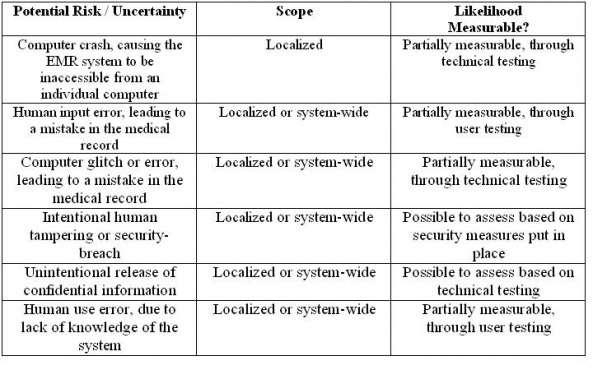Electronic Medical Records
EMRs and Society
It is important to consider EMRs from a "Technology and Society" vantage point. This perspective recognizes that there are many themes that appear in all cases in which technology and society interact with one another. Analyzing the issue in the context of these themes can help to understand the problem in a number of different manners and allow for a more intelligible and insightful debate.
Innovation and Maturation
One of the themes of the "Technology and Society" perspective is that the design of a technological system cannot be considered independent of its implementation and usage. Looking at the issue simply as a technological system would leave out many of the important aspects of this debate, such as:
Another theme of the "Technology and Society" perspective is that the technology must be analyzed from a number of different levels and scopes, which contain different systems and standardization problems of their own.
Risk and Failure
There are myriad risks and possible failures of EMR systems. As mentioned on the home page, the reason that this issue is so difficult to resolve is because of the importance and sensitivity of the application. As such, any small glitch or error, or malicious attack, has extreme consequences to those affected. A few such risks and failures include:
It is important to consider EMRs from a "Technology and Society" vantage point. This perspective recognizes that there are many themes that appear in all cases in which technology and society interact with one another. Analyzing the issue in the context of these themes can help to understand the problem in a number of different manners and allow for a more intelligible and insightful debate.
Innovation and Maturation
One of the themes of the "Technology and Society" perspective is that the design of a technological system cannot be considered independent of its implementation and usage. Looking at the issue simply as a technological system would leave out many of the important aspects of this debate, such as:
- What economic incentives are there for company's to improve EMR systems, or for new firms to enter the industry? Are firms incentivized to improve their current systems?
- How can it be ensured that EMR systems are easy and efficient for doctors, nurses, administrators, and researchers? In what ways do their needs differ? How can they be trained, and how should their training differ?
- What incentives are there for computer hackers to try to break into EMR systems? How resilient will they be to such threats?
Another theme of the "Technology and Society" perspective is that the technology must be analyzed from a number of different levels and scopes, which contain different systems and standardization problems of their own.
- As a technical problem, EMRs are complicated systems that have not yet been standardized. This is a major issues for the success of the technology. Currently, there are a number of systems that operate differently and do not work well in conjunction. As such, healthcare professionals may be required to understand more than one system or how to convert records from one system to another. A lack of standardization also makes training more difficult, as there is not one tutorial that can help education healthcare professionals.
- EMRs are also a logistical problem. Can medical abbreviations that used to be doctor specific be standardized? Can EMR systems be integrated into the hospital cost-effectively? Can everyone be taught to use them? What will be the maintenance procedures? Who will check for security breaches and healthy functioning of the system? Is anyone put out of a job because of EMRs or are new jobs created?
- EMRs also raise legislative concerns. The current paper-based medical system is well-known, and it is well-understood how healthcare laws and regulations affect the system. Since many of these regulations were conceived before EMR technology was available, it is necessary for legislators at state and national levels to reconsider how certain laws should apply to the new technology, and whether new legislative measures are necessary.
- EMRs overlap with insurance systems. What would happen if insurance companies were able to access EMRs? The incentives of insurance companies, healthcare professionals, administrators, researchers, and patients often do not align. Are the necessary precautions in place to mitigate these conflicting desires?
Risk and Failure
There are myriad risks and possible failures of EMR systems. As mentioned on the home page, the reason that this issue is so difficult to resolve is because of the importance and sensitivity of the application. As such, any small glitch or error, or malicious attack, has extreme consequences to those affected. A few such risks and failures include:
Ethics and Expertise
It is important to consider who is qualified to make decisions on this issue and that a wide range of relevant views are taken into consideration in the debate. A lot of the literature on the web is written by Washington D.C. think tanks and lay writers. A more rounded audience for this debate would include:
It is important to consider who is qualified to make decisions on this issue and that a wide range of relevant views are taken into consideration in the debate. A lot of the literature on the web is written by Washington D.C. think tanks and lay writers. A more rounded audience for this debate would include:
- Healthcare professionals, including doctors, nurses, and hospital administrators
- Medical researchers
- Patients
- Legislators and government officials well-versed in healthcare technology, rules and regulations
- IT experts and consultants
- Think tanks and advocacy groups
- Technology and society experts

